外研版四年级下册英语动词过去式
外研版英语 4下 Did you fall off your bike (2)
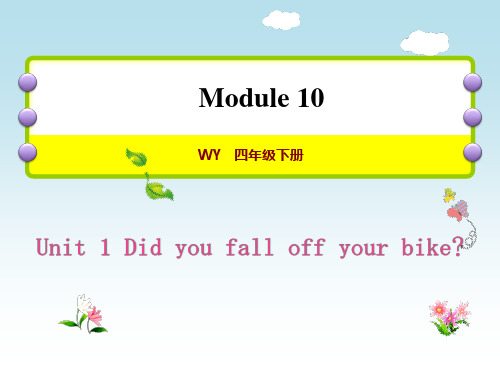
A. buy
B. bought C. buys
点拨:因为句子中有明确的表示过去的时间状yesterday, 所以需要用一般过去时,因此选择答案B。
3. He ___B____ the bag on the bike. But the bike fell down.
A. carries B. carry
考向:这是一般过去时的一般疑问句及其回答。 fall off 的意思是“从……摔下来”。
短语辨析:
fall off
eg:That girl fell off her
跌落,off 为介词,bike.
后接名词。
那个女孩从她的自行车
上摔了下来。
摔倒,down 为 fall down 副词,后可不接
词。
eg:The bike fell down. 自行车倒了。
例句: Sam carried the watermelon on the bike. 萨姆用自行车带着西瓜。
同义词: take/bring
动词过去式的变化规则(四): 以辅音字母加y 结尾的,把y 变成i,再加ed。如: cry—cried
知识点12 —Did you fall off your bike? 你从你的自行车上摔下来了吗? —No,Sam fell off his bike. 没有,萨姆从他的自行车上摔了下来。
Girl: What happened to your head,Daming? Daming: Oh,Sam and I went for a bike ride yesterday. Amy: And then...? Daming: And then we were hungry and thirsty. Amy: Did you buy some water? Daming: No,we bought a watermelon. Daming: Sam carried the watermelon on the bike. Amy: Did you fall off your bike? Daming: No,Sam fell off his bike. Daming: And I bumped my head! Then he took me and the watermelon to the
最新外研版小学四年级英语下学期知识点总结
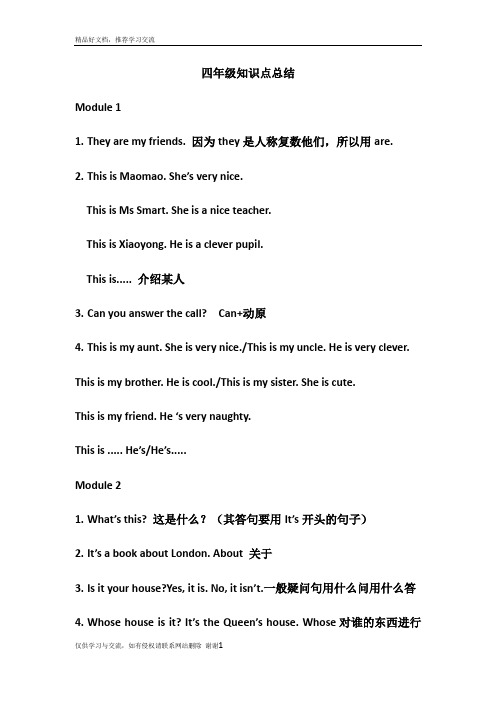
四年级知识点总结Module 11.They are my friends. 因为they是人称复数他们,所以用are.2.This is Maomao. She’s very nice.This is Ms Smart. She is a nice teacher.This is Xiaoyong. He is a clever pupil.This is..... 介绍某人3.Can you answer the call? Can+动原4.This is my aunt. She is very nice./This is my uncle. He is very clever. This is my brother. He is cool./This is my sister. She is cute.This is my friend. He ‘s very naughty.This is ..... He’s/He’s.....Module 21.What’s this? 这是什么?(其答句要用It’s开头的句子)2.It’s a book about London. About 关于3.Is it your house?Yes, it is. No, it isn’t.一般疑问句用什么问用什么答4.Whose house is it? It’s the Queen’s house. Whose对谁的东西进行提问Queen’s house名词所有格,表示......的5.It’s close to the Queen’s house. Close to 靠近6.London Bridge is falling down. Be(am ,is, are)+v.ing 表示正在发生的事情。
现在进行时态。
Module 3.1.Sam can ride a bike. Amy can fly a kite. Can+ 动原ride a bike译为骑自行车。
四年级英语外研版下册知识点总结
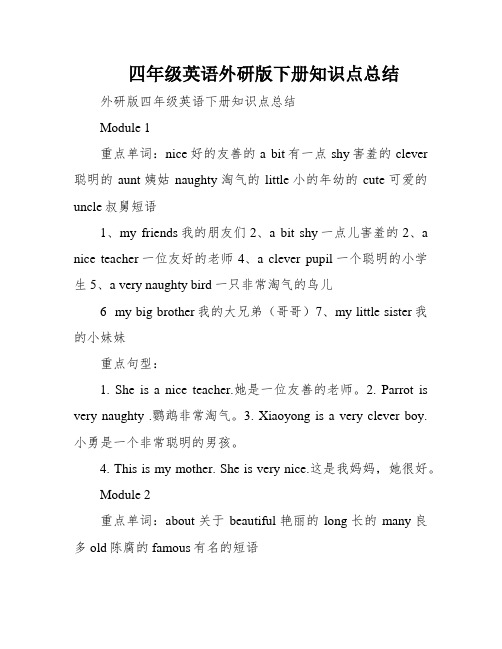
四年级英语外研版下册知识点总结外研版四年级英语下册知识点总结Module 1重点单词:nice好的友善的a bit有一点shy害羞的clever 聪明的aunt姨姑naughty淘气的little小的年幼的cute可爱的uncle叔舅短语1、my friends我的朋友们2、a bit shy一点儿害羞的2、a nice teacher一位友好的老师4、a clever pupil一个聪明的小学生5、a very naughty bird一只非常淘气的鸟儿6 my big brother我的大兄弟(哥哥)7、my little sister我的小妹妹重点句型:1. She is a nice teacher.她是一位友善的老师。
2. Parrot is very naughty .鹦鹉非常淘气。
3. Xiaoyong is a very clever boy.小勇是一个非常聪明的男孩。
4. This is my mother. She is very nice.这是我妈妈,她很好。
Module 2重点单词:about关于beautiful艳丽的long长的many良多old陈腐的famous有名的短语1、一本关于伦敦的书abookaboutLondon2、来自…(是…人)befrom…3、英国的都城thecapitalofEngland4、白金汉宫Buckingham Palace5、女王的屋子the Queen’s house6、泰晤士河the River Thames7、在河上on the river8、大本钟Big Ben9、海德公园Hyde Park 10、塔桥Tower Bridge重点句型:1. This is a book about London.这是一本关于伦敦的书。
2. London is a big city.伦敦是个大城市。
3.Whose house is it?这是谁的屋子?it’s the Queen’s house这是女王的屋子4. A: Is it your house?那是你的房子吗?B:No, it’s the Queen’s house.不,那是女王的房子。
外研版英语 四年级下册 词汇专项练习【汇总】

外研版英语四年级下册词汇专项练习【汇总】一、写出下列动词的过去式1. have2. do3. drink4. make5. take6. dance7. take 8. phone 9. come10. travel 11. fly 12. learn13. am 14. is 15. are16. cook 17. love 18. see19. sing 20. go 21. eat22. tell 23. fall 24. row25. ride 26. bump 27. carry28. buy 29. happen 30. find31. play 32. live 33. visit34. get 35. talk 36. help37. read 38. wash 39. watch 40. listen 41. laugh 42. write43. feel 44. carry 45. put46. stop 47. jump 48. swim二、汉译英1. 有点儿害羞2. 一个聪明的小学生3. 去野餐4. (将来)有一天5. 去公园6. 做蛋糕7. 乘坐飞机8. 在度假9. 玩得开心10. 跌落11. 做家庭作业12. 看电视13. 唱歌14. 放风筝15. 踢足球16. 打篮球17. 划船18. 骑自行车19. 洗衣服20. 打乒乓球21. 听音乐22. 做家务23. 玩电脑24. 住在25. 下周26. 又饿又渴27. 在星期一28. 在星期二29. 在星期三30. 在星期四31. 在星期五32. 在星期六33. 在星期天34. 摔倒35. 制作一张海报36. 一本关于伦敦的书37. 在湖面上38. 买一些水39. 喝水40. 上学41. 在度假42. 给我们拍照43. 读书44. 做游戏45. 玩得开心46. 为什么不呢?47. 去医院48. 和……交谈49. 和……一起散步50. 制作面条51. 给他的朋友打电话52. 和一些饮料53. 起床54. (得了)感冒55. 从椅子上跌落下来56. 撞伤了他的头57. 抱着他进了小汽车58. 去看医生59. 给汤姆买一些巧克力60. 吃光61. (得了)胃痛62. (患)头痛63. 在家64. 做所有事情65. 帮助妈妈66. 帮助孩子们学习67. 和我的朋友们一起玩68. 拜访我的祖母69. 去游泳70. 为我读书71. 距离女王的房子很近72. 接电话73. 帮助我走路74. 去动物园75. 一个小乡村76. 在地球上77. 煮面条78. 做面包79. 许多美味的食物80. 画画81. 一位友好的老师82. 带一些花生三、按要求写单词1. young(反义词)2. were not(缩写)3. thin(反义词)4. watched(动词原形)5. fever(英译汉)6. hot(反义词)7. this(对应词)8. down(反义词)9. swim(现在分词)10. live(单三)11. 描写天气的词12. little(反义词)13. dirty(反义词)14. long(反义词)15. ugly(反义词)16. city(复数)17. city(对应词)18. made(原形)19. then(对应词)20. beautiful(副词)21. went(原形)22. will not(缩写)23. does not(缩写)24. did not(缩写)25. have(单三)26. have got(过去式)27. aunt(对应词)28. good(对应词)29. him(主格)30. us(主格)31. they(宾格)32. us(形容词性物主代词)33. so(对应词)34. was not(缩写)35. were not(缩写)36. well(同义词)37. sun(形容词)38. fun(形容词)39. I(宾格)40. she(宾格)41. who(形容词性物主代词)42. cloud(形容词)43 have a headache(英译汉) 44. have a cold(英译汉)45. have a stomach ache(英译汉) 46. have a toothache(英译汉) 47. Chinese(名词) 48. say(过去式)49. slow(反义词)50. nice(反义词)四、翻译下列专有名词(Proper Nouns)及生词1. Big Ben2. US3. Washington DC4. England5. Hong Kong6. London7. Buckingham Palace 8. Hyde Park9. London Bridge 10. the Great Wall11. Tower Bridge 12. West Lake13. New York 14. San Francisco15. play the piano 16. biscuit17. toothache 18. play the guitar19. cola 20. KFC21. drum 22. erhu23. zither 24. flute25. weekend 26. fire truck27. ice cream 28. help mother with housework 29.watch sports on TV。
外研社英语三起四年级下册知识点全
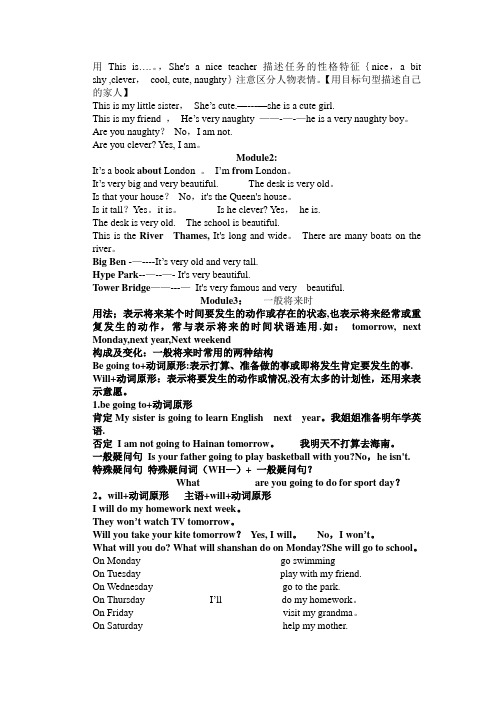
用This is….。
,She's a nice teacher 描述任务的性格特征{nice,a bit shy ,clever,cool, cute, naughty}注意区分人物表情。
【用目标句型描述自己的家人】This is my little sister,She’s cute.—---—she is a cute girl.This is my friend ,He’s very naughty ——-—-—he is a very naughty boy。
Are you naughty?No,I am not.Are you clever? Yes, I am。
Module2:It’s a book about London 。
I’m from London。
It’s very big and very beautiful. The desk is very old。
Is that your house?No,it's the Queen's house。
Is it tall?Yes。
it is。
Is he clever? Yes,he is.The desk is very old. The school is beautiful.This is the River Thames, It's long and wide。
There are many boats on the river。
Big Ben -—----It’s very old and very tall.Hype Park--—--—- It's very beautiful.Tower Bridge——---—It's very famous and very beautiful.Module3:一般将来时用法;表示将来某个时间要发生的动作或存在的状态,也表示将来经常或重复发生的动作,常与表示将来的时间状语连用.如:tomorrow, next Monday,next year,Next weekend构成及变化:一般将来时常用的两种结构Be going to+动词原形:表示打算、准备做的事或即将发生肯定要发生的事. Will+动词原形:表示将要发生的动作或情况,没有太多的计划性,还用来表示意愿。
外研版小学英语(三起)四年级下册单词表

Module 1nice[nais]友好的,亲切的clever['klevə] 聪明的naughty['nɔ:ti] 淘气的a bit 有一点shy[ʃai] 害羞的answer['ɑ:nsə]接(电话)call[kɔːl]电话,打电话bad[bæd] 不好的,坏的cool[ku:l] 酷的aunt[ɑ:nt] 阿姨;姑妈;伯母uncle['ʌŋkl]叔叔,伯伯,舅父 big [big] 年龄较大的little['litl] 小的,年幼的cute[kju:t] 可爱的Module 2city['siti] 城市ship[ʃip] 船beautiful['bju:təfəl]美丽的whose[hu:z] 谁的queen[kwi:n] 女王close[kləʊs] 近的,接近的old[əuld] 古老的famous['feiməs]著名的Module 3robot['rəubɔt] 机器will [wil] 将,将会everything['evriθiŋ]所有事情one day (将来)有一天housework['hauswə:k]家务learn[lə:n] 学习our['auə] 我们的homework['həumwə:k] 家庭作业won't[wəʊnt]=will not 将不会Monday['mʌndei]星期一Tuesday['tju:zdi]星期二Wednesday['wenzdi]星期三Thursday['θə:zdi]星期四Friday['fraidi]星期五Saturday['sætədi]星期六Sunday['sʌndi]星期日have[hæv] 有,拥有next[nekst] 下一个的week[wi:k] 星期,周holiday['hɒlidei] 假期Module 4take[teik] 带走,拿走,fly[flai] 飞picnic['piknik] 野餐great[greit] 太好了why[wai] 为什么Why not为什么不呢? because[bi'kɔ:z] 因为so[səu] 所以cloudy['klaʊdi] 多云的weather['weðə] 天气Module 5was[wɒz] 是(am/is的过去式)then[ðen]当时,那是grandparent ['grænd,pɛərənt] (外)祖父(母)were[wə]是,(are的过去式)young[jʌŋ]年轻的old[əuld] 年长的hair[hɛə] 头发so[səu] 这么 ,那么short[ʃɔ:t] 短的long[lɔŋ]长的wasn’t=was not不是weren’t=were not不是clean[kli:n] 干净的dirty['dɜ:ti] 脏的Module 6yesterday['jestədei] 昨天 out [aʊt] 不在家well[wel] 健康的thanks[θæŋks]谢谢sun[sʌn] 太阳lesson['lesn] 一堂课village['vilidʒ] 乡村Module 7had[hæd]( have的过去式)度过phone[fəun] 打电话cook[kuk] 烹饪,烧(菜)really['riəli] 真的wash[wɒʃ] 洗what[wɒt] about[ə'baut]…?…怎么样?did[did](do的过去式)助动词didn’t=did not 没有computer[kəm'pju:tə] 计算机;电脑love[lʌv] 爱,喜欢him[him] 他(宾格)Mrs['misiz] 太太;夫人Miss[mis] 小姐Module 8sang[sæŋ]唱歌beautifully['bju:təfli] 优美地saw [sɔː]( see的过去式)看见game[geim] 游戏;比赛last[lɑ:st] 最近过去的fun[fʌn] 有趣的事went[went] (go的过去式)去…there[ðeə] 在那儿ate[et] (eat的过去式)吃drank[dræŋk](drink的过去式)喝time[taim] 一段时间have a good time玩得开心busy['bizi] 忙碌的took[tʊk] (take的过去式)拍摄tell[tel] 告诉great[greit] 非常好的delicious[di'liʃəs] 美味的;可口的made[meid] (make的过去式)做,制成poster['pəʊstə] 海报,招贴画Module 9welcome['welkəm] 欢迎postcard['pəʊskɑːd]明信片cousin['kʌzn] 堂兄弟姊妹;表兄弟姊妹dear[diə] 亲爱的on holiday['hɒlidei]在休假travel['trævl] 旅行came[keim]come的过去式来pop[pɒp] 流行音乐concert['kɒnsət] 音乐会earth[ɜːθ]地球Module 10fall [fɔːl]掉下,落下fall off 跌落fell [fel](fall的过去式) 掉下,落下fall down 摔倒,跌倒found[faʊnd] 发现,找到town[taʊn] 城镇,市镇happen['hæpən] 发生ride[raid] 骑,乘then[ðen] 然后thirsty['θə:sti] 口渴water['wɔ:tə] 水bought[bɔ:t] (buy)买。
四年级英语下册知识讲义-说一说(Module 7 Unit 2 Grandma cooked fish.)-外研版(三起)
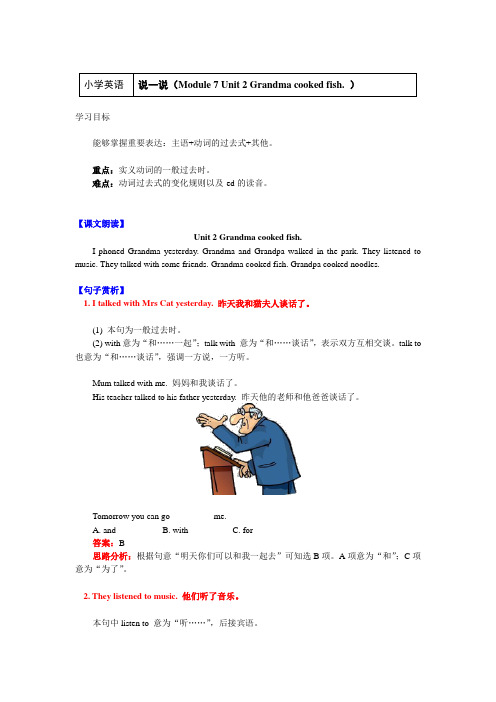
小学英语说一说(Module 7 Unit 2 Grandma cooked fish. )学习目标能够掌握重要表达:主语+动词的过去式+其他。
重点:实义动词的一般过去时。
难点:动词过去式的变化规则以及-ed的读音。
【课文朗读】Unit 2 Grandma cooked fish.I phoned Grandma yesterday. Grandma and Grandpa walked in the park. They listened to music. They talked with some friends. Grandma cooked fish. Grandpa cooked noodles.【句子赏析】1. I talked with Mrs Cat yesterday. 昨天我和猫夫人谈话了。
(1) 本句为一般过去时。
(2) with意为“和……一起”;talk with 意为“和……谈话”,表示双方互相交谈。
talk to 也意为“和……谈话”,强调一方说,一方听。
Mum talked with me. 妈妈和我谈话了。
His teacher talked to his father yesterday. 昨天他的老师和他爸爸谈话了。
Tomorrow you can go _________ me.A. andB. withC. for答案:B思路分析:根据句意“明天你们可以和我一起去”可知选B项。
A项意为“和”;C项意为“为了”。
2. They listened to music. 他们听了音乐。
本句中listen to 意为“听……”,后接宾语。
listened是动词listen的过去式。
过去式的变化有几种,现介绍其中的四种:规则动词的变化方法:(1) 一般的直接在动词后加-ed,如:talk→ talked;cook → cooked。
(2) 以不发音的字母e结尾的,在动词后加-d,如:dance → danced;phone→ phoned。
四年级英语动词原形和过去式
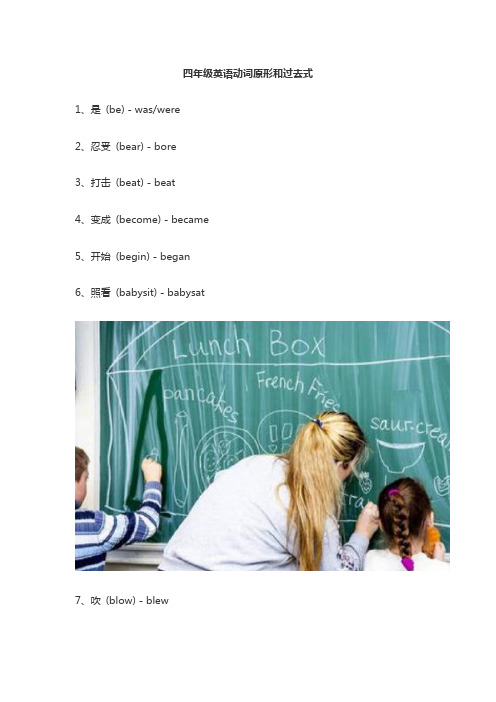
四年级英语动词原形和过去式1、是(be) - was/were2、忍受(bear) - bore3、打击(beat) - beat4、变成(become) - became5、开始(begin) - began6、照看(babysit) - babysat7、吹(blow) - blew8、打破(break) - broke9、带来(bring) - brought10、建造(build) - built11、买(buy) - bought12、能够(can) - could13、抓住(catch) - caught14、选择(choose) - chose15、来(come) - came16、花费(cost) - cost17、割(cut) - cut18、受伤(hurt) - hurt19、打(hit) - hit20、让(let) - let学习英语的技巧:1、培养语感英语作为一种语言,需要培养语感。
培养语感的方法有很多,例如多听、多说、多读、多写。
听英语音乐、看英语电影、听英语新闻、读英语文章、写英语日记等都是很好的方法。
通过不断地接触英语,让自己沉浸在英语环境中,可以更好地掌握英语语言的感觉和表达方式。
2、学习语法语法是英语学习的重要基础。
学习语法需要系统性和条理性,可以购买语法教材或上网查找相关的语法资料。
要在实践中不断地应用语法知识,通过不断地练习和运用,加深对语法的理解和掌握。
3、练习口语口语是英语学习中非常重要的一部分。
练习口语可以培养语感和提高口语表达能力。
可以通过和英语母语者交流、参加英语角、模拟对话等方式进行口语练习。
可以借助语音识别软件、语音聊天工具等工具进行自我练习和评估。
外研版英语(三起点)四年级下册知识点归纳
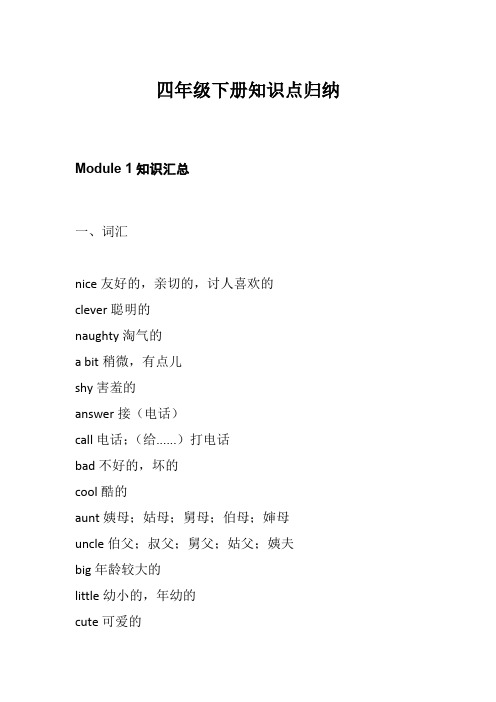
四年级下册知识点归纳Module 1知识汇总一、词汇nice友好的,亲切的,讨人喜欢的clever聪明的naughty淘气的a bit稍微,有点儿shy害羞的answer接(电话)call电话;(给......)打电话bad不好的,坏的cool酷的aunt姨母;姑母;舅母;伯母;婶母uncle伯父;叔父;舅父;姑父;姨夫big年龄较大的little幼小的,年幼的cute可爱的二、句子1. She is a nice teacher. 她是一名好老师。
2. Look, the elephant is clever. 看,大象很聪明。
3. Parrot is very naughty! 鹦鹉很淘气。
4. This is my aunt. 这是我阿姨。
5. He’s a bit shy. 他有点害羞。
6. This is Maomao. She’s nice. But she’s a bit shy. 这是毛毛。
她很可爱。
但是有点害羞。
三、句型结构介绍某人(是谁、性格特点)This is ... He / She is + 描写人物性格特点的形容词.eg: This is my uncle. He is tall and clever. 这是我叔叔。
他很高很聪明。
This is my teacher. She is thin and nice. 这是我的老师。
她很瘦很漂亮。
四、单词辨析little 和smalllittle 表示“小的”,带有感情色彩small主要指的是“尺寸”、“重量”等,本身不带任何感情色彩eg: I have a little sister. 我有一个小妹妹。
(含有“喜欢”的意思)The box is too small. 盒子太小了。
(单纯指的是盒子的大小)Module 2知识汇总一、词汇city城市ship船beautiful美丽的whose谁的queen女王close近的,接近的old年代久的,古老的famous著名的景点名称:Buckingham Palace白金汉宫Big Ben大本钟Hyde Park海德公园Tower Bridge塔桥London Bridge伦敦大桥二、句子1. —What’s this? 这是什么?—It’s a book about London. 是关于伦敦的一本书。
外研版(一年级起点)四年级英语[下册]第3模块知识点和习题
![外研版(一年级起点)四年级英语[下册]第3模块知识点和习题](https://img.taocdn.com/s3/m/d67af3680975f46526d3e171.png)
Module 1【关键知识点】✧“要别人做某事或不做某事”用祈使句,句中动词要用原形。
➢表示禁止的:Don’t…please!➢表示肯定的:Wear… please!祈使句:动词原形开头,省略主语(变否定直接在动词前面加Don’t)Eg:Open the door,变否定为Don’t open the door【重要句型】➢Don’t sing here! 不要在这儿唱歌。
➢Don’t write here! 不要在这儿写字。
➢Don’t talk here! 不要在这儿说话。
➢Wear the glasses! 戴上眼镜。
➢Wear the hat! 戴上帽子。
➢Stop! 停下来。
➢Don’t feed the ducks! 不要喂鸭子。
➢Don’t walk on the grass! 不要踩草地。
➢Don’t touch the machines! 不要碰这些机器。
➢Don’t write on the books! 不要在书上写字。
➢Silence! 安静。
➢Wash your hands! 洗手。
【重要词汇】1.factory 的复数是factories 工厂2.children孩子们,单数是child3.these这些,单数是this4.those那些,单数是that5.crisp炸薯片,复数是crisps6.do的三人称单数是does 做7.wash的三人称单数是washes 洗8.put的三人称单数是puts 放9.potato的复数是potatoes练习:一、单项选择1.Don’t______ on the grass A. walks B.walk C.walking2.Please______the door A.open B.opens C.opening二、填上适当的词1.This machine____(make) crisps2.Don’t______(walk) on the grass3.You can have a bag of____(crisps) now4.What____(do) this factory do?5.These_____(machine)cut potatoes6.It_____(wash) the tomatoes7.Don’t______(touches) the machines8.This machine____(put)the crisps in the bags9.The baby is____(sleep) now10.They are____(potato)Module 2【关键知识点】✧重点学习用形容词来形容物品,主要句型是:➢This …is….➢It’s…【重要句型】➢This computer is beautiful. It’s purple. 这台电脑很漂亮。
2023年外研版英语四年级下册Module 8 Unit 1 They sang beautiful
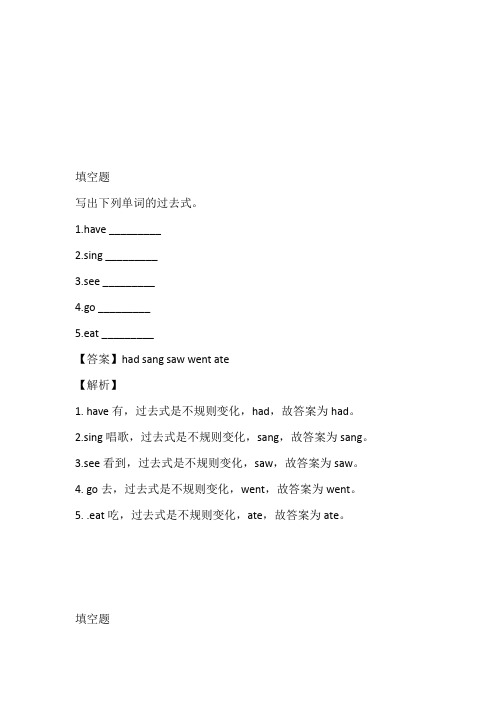
填空题写出下列单词的过去式。
1.have _________2.sing _________3.see _________4.go _________5.eat _________【答案】had sang saw went ate【解析】1. have有,过去式是不规则变化,had,故答案为had。
2.sing唱歌,过去式是不规则变化,sang,故答案为sang。
3.see看到,过去式是不规则变化,saw,故答案为saw。
4. go去,过去式是不规则变化,went,故答案为went。
5. .eat吃,过去式是不规则变化,ate,故答案为ate。
填空题写出下列单词的过去式。
1.drink _________2.dance _________3.listen _________4.has _________5.make _________【答案】drank danced listened had made【解析】1. drink喝,过去式是不规则变化,drank,故答案为drank。
2. dance跳舞,过去式是规则变化,在后面加ed,danced,故答案为danced。
3. listen听,过去式是规则变化,在后面加ed,listened,故答案为listened。
4. has有,过去式是不规则变化,had,故答案为had。
5. make制做,过去式是不规则变化,made,故答案为made。
翻译英译汉。
1.play game _____________________2.sing a song_____________________3.have a picnic_____________________st Sunday_____________________5.eat some food_____________________【答案】做游戏唱歌野餐上个星期天吃一些食物【解析】1. play 玩,game游戏,故答案为做游戏。
外研版四年级英语下册Module 7 谈论过去的行为

Module 7 谈论过去的行为一、重点词汇。
(英汉互译)(一)表示过去的行为1. (have 的过去式)度过___________________2. (do 的过去式)助动词___________________(二)行为动词1. 烹调;煮;烧___________________2. 洗___________________3. 爱;喜欢___________________4. phone___________________(三)其他1. 计算机;电脑___________________2. (宾格)他___________________3. 太太,夫人___________________4. 小姐___________________5. really___________________(四)短语1. 划船___________________2. 煮面条___________________3. 洗衣服___________________4. 和……谈话___________________5. listen to music___________________6. play on the computer___________________二、重点句子。
(英汉互译)(一)谈论过去的行为1. 我帮助了妈妈。
_________________________________________________________ 2. 奶奶做了鱼。
_________________________________________________________3. 我昨天给奶奶打了电话。
_________________________________________________________ 4. 他们听了音乐。
_________________________________________________________ 5. I cooked noodles yesterday._________________________________________________________ 6. He played on the computer and he watched TV._________________________________________________________ 7. I talked with Mrs Cat yesterday._________________________________________________________(二)赞美、描述他人或事物1. 你是一个好女孩。
外研版四年级英语下册Module 9 询问和描述过去的行为附答案

外研版四年级英语下册Module 9 询问和描述过去的行为一、重点词汇。
(英汉互译)(一)动作、行为1. 欢迎_______________2. 旅行;游历_______________3. (come 的过去式)来_______________(二)其他1. 表(堂)兄弟;表(堂)姐妹_______________2. 亲爱的_______________3. postcard_______________4. pop_______________5. concert_______________6. earth_______________(三)短语1. 居住在_______________2. 来这里_______________3. 去地球_______________4. 度过一个愉快的假期_______________5. 欢迎来到……_______________6. go to a pop concert_______________7. visit New York_______________二、重点句子。
(英汉互译)(一)询问对方或某人过去的行为及回答1. ——他去年住在纽约吗?——不,他没有。
____________________________________________________________ ____________________________________________________________ 2. ——他乘飞机旅行的吗?——是的。
____________________________________________________________ ____________________________________________________________3. —Did you have a nice holiday?—Yes,it was great.____________________________________________________________ ____________________________________________________________(二)描述过去的行为1. 我们也去了一场音乐会。
外研版小学英语(一起)四年级下册知识点汇总

一、词汇machine 机器dangerous 危险的each 各自,每个2.—What does this machine do,sir? 这个机器是做什么的,先生?—It washes the potatoes. 它是洗土豆的。
3.Don’t touch the machines,please! 请不要触摸这些机器!4.They are dangerous. 它们很危险。
5.You can each have a bag of crisps. 你们每人可以得到一包薯条。
6.Don’t feed the baby. 不要给那个婴儿喂食。
7.Play with the baby! 和婴儿一起玩。
8.Don’t write on the books. 不要在书上写字。
9.Don’t walk on the grass! 不要踩草坪。
10.Be quiet,please! 请安静!三、句型结构1.Don’t + 动词原形 + 其他. 用于提醒某人不要做某事。
eg:Don’t make noise in class. 不能在课堂上喧闹。
2.动词原形 + 其他. 祈使句,表示让(请)某人做某事。
eg:Hold on, please. 请稍等。
Be careful! 小心!外研一起四年级下册Module 2 知识汇总一、词汇cheap 便宜的expensive 昂贵的send 发送;寄email 电子邮件cost 花费;价钱为hundred 一百二、句子1.I’ve got a new hat. 我有一顶新帽子。
2.— What colour is it? 它是什么颜色的?—It’s pink. 它是粉色的。
3.— Is it pink? 它是粉色的吗?—No,it isn’t. 不,它不是。
4.Dad bought a new computer for me yesterday. 爸爸昨天给我买了一台新电脑。
外研版小学英语不规则动词变化表

外研版小学英语不规则动词变化表在英语学习中,动词的变化形式是学习的重要一环。
对于小学生来说,不规则动词的变化更是学习的难点。
然而,只要我们掌握了不规则动词的变化规律,学习就会变得轻松许多。
本文将以外研版小学英语为例,详细介绍不规则动词的变化表。
一、第一组不规则动词1、be (am/is/are) - was/were2、go - went3、do - did4、have - had5、see - saw6、say - said7、give - gave8、write - wrote9、take - took这些动词的原形和过去式都是相同的,只是在过去时态中使用助动词did来帮助构成句子。
例如:I went to the park yesterday. (我昨天去了公园。
)二、第二组不规则动词1、become - became2、bring - brought3、buy - bought4、eat - ate5、find - found6、fly - flew7、get - got8、go - went9、know - knew这些动词的原形和过去式也不相同,但它们的变化是有规律的。
例如:buy - bought,fly - flew。
这些动词在句子中使用时,需要使用助动词did来帮助构成句子。
例如:I bought a new book yesterday. (我昨天买了一本新书。
)三、第三组不规则动词1、do - did2、go - went3、have - had4、make - made5、say - said6、see - saw7、write - wrote8、take - took10、go away - went away11、go home - went home12、go to bed - went to bed13、go to school - went to school14、go to the park - went to the park15、go to work - went to work等。
四年级下册英语教案-Module8Unit1Theysangbeautifully|外研社(三起)

四年级下册英语教案Module 8 Unit 1 They sangbeautifully|外研社(三起)教学内容本课为外研社(三起)四年级下册英语教材Module 8 Unit 1They sang beautifully。
课程内容主要围绕一般过去时态的运用,通过描述过去的活动,让学生学会使用动词的过去式。
教学内容包括动词过去式的构成规则,常用的动词过去式,以及如何运用一般过去时描述过去发生的事情。
教学目标1. 知识与技能:学生能够听懂、会说、会读本课的单词和句子,掌握动词过去式的构成规则,并能用一般过去时描述过去发生的事情。
2. 过程与方法:通过情景创设、小组合作、任务驱动等教学活动,培养学生的英语听说能力和合作学习能力。
3. 情感态度与价值观:激发学生学习英语的兴趣,培养他们积极向上的情感态度,增强他们的跨文化交际意识。
教学难点1. 动词过去式的构成规则,尤其是不规则动词的过去式。
2. 一般过去时的运用,包括时间状语和动词过去式的搭配。
教具学具准备1. 教具:多媒体设备、PPT课件、黑板、粉笔。
2. 学具:英语课本、练习册、文具。
教学过程1. 导入:通过歌曲或游戏引起学生的兴趣,引出本课的主题。
2. 新课呈现:通过图片、故事、情景创设等方式,展示本课的主要教学内容。
3. 操练:通过听、说、读、写的活动,让学生熟练掌握本课的知识点。
4. 应用:通过角色扮演、小组讨论、任务驱动等活动,让学生运用所学的知识解决实际问题。
板书设计1. Module 8 Unit 1 They sang beautifully2. 主要内容:动词过去式的构成规则、常用动词过去式、一般过去时的运用。
3. 关键词:sang, beautifully, yesterday, last week, two days ago等。
作业设计1. 听力练习:听懂并复述本课的故事。
2. 口语练习:用一般过去时描述自己过去的一天的活动。
